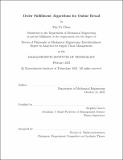Order Fulfillment Algorithms for Online Retail
Author(s)
Chen, Pin-Yi
DownloadThesis PDF (4.791Mb)
Advisor
Graves, Stephen
Terms of use
Metadata
Show full item recordAbstract
We study an order fulfillment problem in an online-retail setting where the retailer’s fulfillment system includes warehouses that hold inventory (fulfillment centers), and a transportation network composed of node facilities and transportation arcs. To minimize the total transportation costs for order fulfillment, the online retailer should plan its transportation capacities properly in advance and execute according to the transportation plan by making smart fulfillment decisions. To fulfill a customer order, the online retailer must decide from where to source the inventory needed for the order, as well as how to route the order to the customer to satisfy a delivery time commitment. In this research we focus on the latter decision, namely choosing the route for each order. The online retailer has full control of its transportation system in both planning and execution; in addition, the online retailer can rely on third party carriers to transport some of its orders.
We design an order fulfillment algorithm that makes immediate routing decisions for incoming orders. To determine the route to assign to an order, we compare the costs of all feasible routes. For routes that use retailer-controlled resources, we need to account for the opportunity costs associated with these resources. We propose to do this with the dual values from a transportation quadratic program, which tries to account for the uncertainty of the network flows to estimate the opportunity costs of depleting resources in the transportation network. The dual values are updated periodically with the most updated system states that include resource capacities and demand forecasts. We numerically test our algorithm on a realistic network with inputs inspired by the actual data from our industry collaborator. We compare our algorithm with several benchmark algorithms, including a LP-based algorithm that mimics the algorithm in the retailer’s current operating system. The experiments show a 50% reduction in the mean percentage difference in shipping cost from the hindsight solution as compared to the LP-based algorithm.
In addition to the fulfillment algorithm, we formulate a capacity planning problem that determines the optimal level of transportation resources in the network for a given demand forecast. When the demand deviates from the planned capacity by a lot, adding or removing planned resources becomes a crucial cost-saving mechanism. Motivated by this, we propose ad hoc truck controllers that make online capacity modification decisions and test it with small examples.
Date issued
2023-02Department
Massachusetts Institute of Technology. Department of Mechanical EngineeringPublisher
Massachusetts Institute of Technology